- GreenMatch
- Top Eco-Friendly Personal Care Products
Eco-Friendly Personal Care: From Myths to Real Solutions for a Sustainable Future

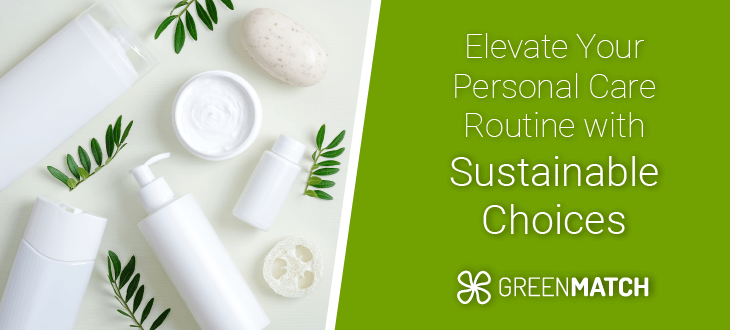
Any product we consume has an environmental cost. And when it comes to personal care products – something we use almost every day – realising their environmental damage can be overwhelming.
Thus, minimising our environmental impact comes to the forefront, so educating yourself about the eco-friendly industry is paramount.
In this article, we'll look into the world of eco-conscious personal care, exploring the benefits of switching to sustainable products and providing insights into how to make informed choices.
What are eco-friendly products?
According to statistics, 55% of consumers are willing to spend more on eco-friendly brands. Logically, brands strive to look eco-friendly as much as possible to attract customers and keep up with the market competition and sustainability trends.
At its core, an eco-friendly product is such that minimises its environmental impact throughout its lifecycle. This means it's made using sustainable and non-toxic materials and includes fair, ethical treatment of workers and positive contributions to the community.
Therefore, eco-friendly products are a way to go for those longing for sustainability and social responsibility.
Benefits of eco-friendly personal care products
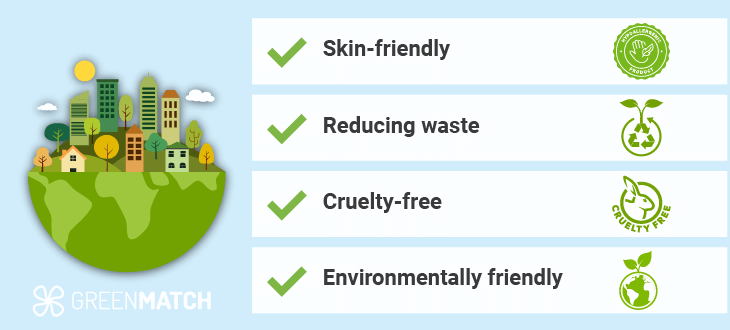
As of 2021, 50% of consumers worldwide considered themselves "eco-friendly." This is due to the following benefits of such products:
But often, brands would abuse the eco-friendly concept to sell more (who would have guessed?). So, if you want to be eco-friendly, here are a few things you must remember when choosing sustainable products.
Popular misconceptions about eco-friendly products
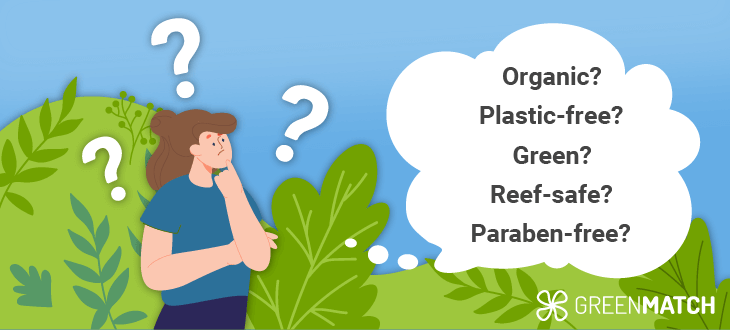
Natural ingredients are safer for the environment
Seeing the word "natural" on the packaging doesn't always translate to it being safe, both for our health and the environment.
For example, chemical sunscreens have been the talk of the eco-friendly world, stating that they pose a danger to the ocean and coral reefs.
There's a lot of chemistry behind the truth, but in a nutshell, studies have shown that neither chemical nor mineral sunscreens have a big environmental impact.
Plastic packaging is bad
The idea that plastic damages the environment is everywhere, not only in skincare. Consumers consider plastic packaging harmful because they focus predominantly on the end-of-life attributes of packaging.
Yet they concern themselves less with the renewable origins of the products or activities relating to manufacturing, transportation, and retail use.
The cold hard fact is using only eco-friendly plastic alternatives (glass, paper, aluminium) would pose more environmental challenges.
A study published in the Journal of Cleaner Production states that going for non-plastic packing would need, on average, 3.6 times the material and 2.2 times more energy, resulting in 2.7 times more CO2 emissions.
There's little to zero heat involved in plastic manufacturing. It's strong and lightweight and can be recycled up to 40 times. Be smart about plastic: buy it but recycle it!
Natural ingredients have less impact on produce
We tend to only care about what we can see and control. When the product ends, it goes to the trash bin. However, there's a lot more going on before the product lands in your hands.
The eco-friendly mindset considers the whole lifecycle of the product. Before the actual use and disposal stage, there's material sourcing, manufacturing, packaging, and distribution. All these stages also have an environmental impact, including ingredients marked as natural.
In fact, it can take hundreds of kilos of materials to produce a single kilo of essential oil. Outsourcing the ingredients also puts the environment in danger.
For example, it's proven that now there's more liquorice being sold than there is being produced. That's alarming as liquorice roots are crucial for sand management, and their uncontrolled harvesting endangers biodiversity conservation.
Eco-friendly personal skincare: tips and tricks
And this was just the tip of the iceberg. There are more questions to answer when it comes to eco-friendly living.
Suppose you do want to stay away from greenwashing and choose truly eco-friendly products. In that case, you can do a few things to be more sustainable:
So, as you see, there's a lot of room for consideration when it comes to eco-friendly products and blanket rules just don't always work.
Here is a list of options that can help you become more sustainable or scoop some inspiration for eco-friendly gifts.
Top eco-friendly personal care products
Zero-waste beauty products

Zero waste philosophy encompasses the idea of minimising waste and reducing the environmental footprint. This approach emphasises using reusable and refillable products, natural and biodegradable ingredients, and embracing minimalist routines that reduce unnecessary consumption.
Opting for zero-waste personal care means choosing solid shampoo and soap bars, natural deodorants, reusable cotton rounds, safety razors, and menstrual cups.
All of these are washable, reusable, and therefore long-lasting. Also, you can always go for self-made skincare products like masks, scrubs, or moisturizers. Buy the biggest volume available so the product lasts for as long as possible.
Biodegradable wipes

In the UK, around 11 billion wet wipes are used, with 90% of them being non-plastic-free. When these wipes make their way to the sewers, the plastic within them disintegrates into microplastics. These microplastics then flow into the sea, threatening marine life as they break down and contribute to beach pollution.
Biodegradable wipes offer a sustainable alternative to regular wipes, which contribute to landfill waste. These wipes are made from plant-based or compostable materials, ensuring they break down naturally without harming the environment.
Bamboo toothbrushes

These toothbrushes have emerged as a popular, eco-friendly alternative to plastic toothbrushes. Bamboo is a renewable resource that is naturally antibacterial and biodegradable, making it a more sustainable choice for oral care.
In 2021, the global bamboo toothbrush market size was valued at $30.2 million and is projected to reach $81.1 million by 2031.
When choosing an eco-friendly toothbrush, look for one with a biodegradable handle made from bamboo or at least wood. The bristles should be made from nylon (but avoid polyester or nylon-6). Choose a toothbrush with a soft or medium-bristled head to avoid damaging your gums.
Scalp massagers
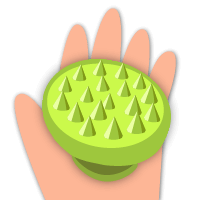
These devices are not just about pampering your scalp; they also promote blood circulation, hair growth, exfoliation, and relaxation. And the scalp massager market is on the rise; by 2028, it will grow by 7.6%.
Some advanced massagers feature vibration, sonic technology, or soft bristles. But this is, of course, not necessary, and some basic scalp care can be performed manually.
Eco-friendly examples of scalp massagers include those made from fully recyclable silicone, wood or bamboo. Also, make sure you're buying from a brand committed to sustainability and using recycled materials in its packaging.
Natural loofahs

Natural loofahs offer a gentle and effective way to exfoliate your skin, leaving it feeling soft and smooth. Loofahs are derived from vegetable-based foam, making them a natural, biodegradable alternative to synthetic exfoliating sponges.
Sourced from agricultural waste, they can last for several months with proper care. Replace them every two to four months, while plastic shower sponges should be replaced every four to six weeks.
As everything is of organic origin, loofahs' shelf life is pretty short, so it's important to take good care of it. Wash them regularly and disinfect them by soaking them in a diluted bleach solution for five minutes once a week. Store your loofah in well-ventilated areas to prevent mould or mildewy smell.
Organic skincare

The global organic skincare market is growing rapidly and is likely to jump from $9.82 to $21.21 between 2021 and 2030.
Organic skincare contains healthier ingredients and reduces the absorption of harmful chemicals.
Some examples of natural organic skincare include aloe vera, coconut oil, honey, or shea butter. On the other hand, parabens and SLS (sodium laureth sulphate) are probably the two most hated ingredients by industry beauticians.
The former prolongs the product's shelf life but is rumoured to cause cancer. The latter is used in foaming formulas but many believe it causes irritation. While the organic industry community avoids them, neither the first nor second side effects have been proven to be true.
This leads to the most common consumer concerns connected with the legacy of the word "organic" itself. According to common understanding, organic skincare minimises the environmental impact through recyclable packaging and sustainable farming.
Yet over the years, some manufacturers turned out to have been abusing the idea of organic skincare without proper certifications. To stay out of shady greenwashing schemes, make sure you read the labels carefully.
Trusted organic products have the organic logo displayed on them, quality control marks, and organic trademarks. Search for "100% Organic" or "Organic" marks and avoid "Made with Organic" or "Organic Ingredients" if you seek truly organic products.
In the UK, several certifiers ensure the authenticity of organic products, such as Cosmos Organic, EcoCert, NaTrue, and the biggest one, The Soil Association.
Organic cotton underwear
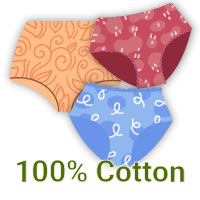
To begin with, cotton cultivation avoids the use of synthetic pesticides and fertilizers, which can contaminate water sources and harm wildlife.
In contrast, organic cotton farming employs techniques that are efficient in water usage and practices natural pest management, thereby minimizing its impact on the environment.
Moreover, organic cotton underwear is naturally kinder to the skin and its softness and breathability provide an enjoyable experience, particularly during warm weather.
When identifying cotton underwear, it is important to look for the USDA Organic label, as it ensures that the cotton doesn't contain synthetic pesticides or fertilizers.
It is also crucial to ensure that the fabric content is 95% organic cotton to guarantee its eco-friendly credentials. It is advisable to give preference to brands that openly disclose their sourcing methods and use packaging that is either made from materials or can be recycled.
Find your eco-friendly personal care products
All in all, switching to eco-friendly personal care products is not just about individual choices; it's about collective action to create a more sustainable future.
By embracing these sustainable alternatives, we can reduce our environmental impact, protect our planet's health, and promote a healthier and more harmonious relationship between humans and the environment.
Remember, every small step counts. Start by incorporating a few eco-friendly products into your routine, and gradually make more sustainable choices as you discover new alternatives.
We strive to connect our customers with the right product and supplier. Would you like to be part of GreenMatch?

